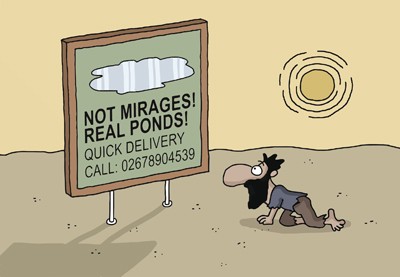A savings mirage?
Among the pitfalls of saving and investing for retirement is to mislead ourselves about the true state of our finances.

An almost textbook example can involve the self-employed. Most of us must have heard small business owners from time to time say things like: "My business is my super". Their intention is, of course, to eventually sell their businesses to finance their retirement – possibly putting the proceeds into super.
As Smart Investing discussed recently (A paradoxical relationship: The self-employed and super), updated research by the Association of Superannuation Funds of Australia (ASFA) confirms once again that the majority of self-employed have little or no super.
This can lead to the issue about how much the self-employed can rely on the value of their businesses as a source of retirement finance to supplement any super and the Age pension.
The authors of the research paper, ASFA's director of research Ross Clare and senior research adviser Andrew Craston, note that ABS figures for 2013-14 suggest that the self-employed, on average, accumulate more non-housing wealth than employees. These non-housing, non-super assets typically comprise cash, shares and business assets.
Indeed, business assets can be a "substantial contributor" to the average wealth of the self-employed.
But as Clare and Craston write, "average figures do not tell the whole story".
The non-housing, non-super assets (including business assets) of the self-employed are likely to vary significantly between individuals.
"For some self-employed individuals," Clare and Craston add, "the value of the business might be little more than the market value of a second-hand utility or truck and some tools of trade. For others, it might be the value of an ongoing business worth a million dollars or more."
(Of course, once businesses become really valuable, many owners would decide to change their business structure, moving away from being self-employed owner-managers of non-incorporated businesses.)
Another way that ASFA has attempted to measure the value of small business assets when owners retire is to look at the capital gains tax (CGT) concessions gained by eligible small business owners upon their possible retirement and sale of their enterprises. This makes interesting reading.
According to tax office statistics for 2012-13, 4,545 vendors of small businesses gained CGT retirement exemptions totalling a little more than $618 million in value. A further 870 small business vendors gained CGT small business, 15-year exemptions (for businesses owned for that length of time) totalling $397.2 million in value. These statistics should be put into context.
Retiring vendors of valuable small businesses would obviously want to benefit from any CGT concessions available from the sale of business assets. Yet considering the huge number of small businesses in Australia, it seems that the value of proceeds from the sale of business assets being used to help finance retirement is modest. And calculating the average concessions again can give a misleading impression.
Self-employed business owners obviously make up just one part of society that may be vulnerable to over-estimating the value of their assets as a means to help provide retirement capital.
Another example are homeowners who may be intending to downgrade or downsize their family homes to provide extra retirement money without first doing the necessary number-crunching.
Whether we are talking about the self-employed, homeowners who are intending to downgrade or whoever, it is important to consider gaining professional quality advice and to make informed decisions about the real adequacy of our retirement savings.
We should be confident that our perceived retirement savings are not a mirage of our own making.
By Robin Bowerman
Smart Investing
Principal & Head of Retail, Vanguard Investments Australia
21 August 2016
Latest eNewsletters
Hot Issues
- AI exuberance: Economic upside, stock market downside
- Becoming a member of an SMSF is easy, but there are other things that need to be considered
- Investment and economic outlook, November 2025
- Move assets before death to avoid tax implications
- ATO issues warning about super schemes
- 12 financial tips for the festive season and year ahead
- Birth date impacts bring-forward NCCs
- Countries with the largest collection or eucalyptus trees
- How to budget using the envelope method
- Accountants united in support for changes
- Investment and economic outlook, October 2025
- Stress-test SMSF in preparation for Div 296
- Determining what is an in-house asset can help determine investment strategy
- Beware pushy sales tactics targeting your super
- Call for SMSF ‘nudge’ in DBFO package
- How Many Countries Divided From The Largest Empire throughout history
- How changes to deeming rates could affect your pension payments
- Five building blocks that could lead to a more confident retirement
- Investment and economic outlook, September 2025
- Caution needed if moving assets to children
- Evolution of ‘ageless workers’ sees retirement age rise
- Younger Australians expect more for their retirement
- New NALE guidance still has issues
- Airplane Fuel Consumption Per Minute
- How $1,000 plus regular contributions turned into $823,000 through compounding


